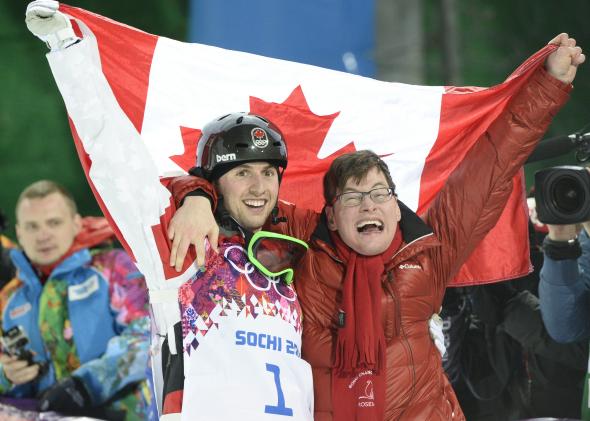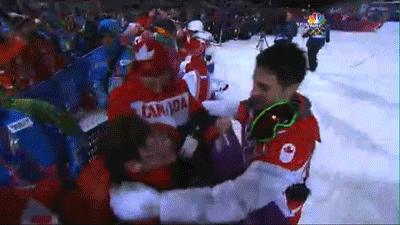Congratulations, NBC: You Finally Made a Tear-Jerking Segment That Isn’t Terrible

Photo by Franck Fife/AFP/Getty Images
On Monday in Sochi, the Québécois freestyle skier Alex Bilodeau won his second consecutive gold medal for Canada in the men’s moguls, and his brother, Frédéric, was there to cheer him on. You may have missed the Bilodeau brothers’ triumph, though, if you were otherwise occupied with the emergency rehydrating and nose-blowing made necessary by the preceding NBC featurette on Alex and Frédéric, who has cerebral palsy. In the segment, Alex speaks movingly of Frédéric’s stamina and fortitude. “If he wouldn’t be handicapped, he would probably be a three-time Olympic champion,” Alex says through tears. “He’s got that motivation.”
After years or decades of enduring NBC’s lachrymose Olympics coverage, you’d think that a veteran viewer’s tear ducts would have dried up and rusted over by now. This is especially true for those of us who came of age during the blighted John Tesh years, when Olympic hopefuls were refused a spot in the finals unless they had first struck backlit poses to New Age compositions before a Vaseline’d lens while a smooth baritone voiceover catalogued the death and/or disease and/or desertion that made the athlete’s Olympic dreams at once more improbable and more palpable for the audience at home. By those standards, the Bilodeau segment was borderline matter-of-fact. It was brisk and to-the-point, the point being to reduce the viewer to a watery heap of melting snow and brotherly devotion.
Even assuming NBC has forever renounced the Tesh crimes of yore, let’s not give it too much credit. Alex Bilodeau is the reason the segment works so well, because he eloquently powers past the usual bromides about “inspiration” and invites us to confront an existential conundrum: If you could extract Frédéric’s character and drive and place it inside a body like Alex’s, would you get a three-time Olympic champion? And even a segment as skillfully executed as this one cannot transcend its essential function, which is to render a star athlete’s less fortunate loved one as a device for dialing up pathos and adversity. We are invited to view Frédéric less as a person than as an object of pity, a useful plot turn. That’s why this segment on the Bilodeaus from the Canadian broadcast network CTV, though very similar to NBC’s (the two spots share much of the same B-roll), is superior: because it does Frédéric the small courtesy of letting him speak for himself.
I would love to see a movie about the Bilodeaus—or any number of other Olympians and their families—by a filmmaker like Lucy Walker, the Oscar-nominated documentarian who made last year’s The Crash Reel, about snowboarder Kevin Pearce and his grueling recovery from a traumatic brain injury. Among The Crash Reel’s supporting players are members of Pearce’s close-knit family, including his older brother David, a Special Olympics competitor with Down syndrome; David’s lifelong struggle to accept his disabilities is mirrored in Kevin’s slow, painful reckoning with the reality that he will never compete again. One of The Crash Reel’s biggest virtues is in treating David not as a plot catalyst or oxytocin trigger but as Kevin’s peer. It’s clear that Alex Bilodeau feels the same way about his brother.

